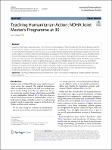Item Infomation
Full metadata record
| DC Field | Value | Language |
|---|---|---|
| dc.contributor.author | Löfquist, Lars | - |
| dc.date.accessioned | 2023-09-19T08:17:46Z | - |
| dc.date.available | 2023-09-19T08:17:46Z | - |
| dc.date.issued | 2023 | - |
| dc.identifier.uri | https://link.springer.com/article/10.1186/s41018-023-00140-7 | - |
| dc.identifier.uri | https://dlib.phenikaa-uni.edu.vn/handle/PNK/9096 | - |
| dc.description | CC-BY | vi |
| dc.description.abstract | Assuming that higher education has a role in the professionalisation of humanitarianism, this article discusses humanitarian work as a subject in higher education. The Network on Humanitarian Action (NOHA) joint master’s programme in International Humanitarian Action is used as a case study for understanding the challenges and potentials in teaching the subject. Teaching challenges are discussed in relation to three themes: interdisciplinary, work-integrated learning and intercultural competencies. These themes are an integrated part of the professionalisation of humanitarian work, since they concern how humanitarian action should be understood and implemented. The NOHA joint master’s programme incorporates a variety of approaches, such as student mobility and a range of courses, to strengthen the student’s education in each of these themes. The last part of the article discusses the future prospects of the programme in response to trends that affect higher education: online teaching and rapid technological change. It is argued that the NOHA network and the NOHA joint master’s programme are well positioned to navigate these trends and continue to be relevant for educating humanitarian professionals. | vi |
| dc.language.iso | en | vi |
| dc.publisher | Springer | vi |
| dc.subject | NOHA joint master’s programme | vi |
| dc.title | Teaching Humanitarian Action: NOHA Joint Master’s Programme at 30 | vi |
| dc.type | Book | vi |
| Appears in Collections | ||
| OER - Pháp luật - Thể chế xã hội | ||
Files in This Item:

